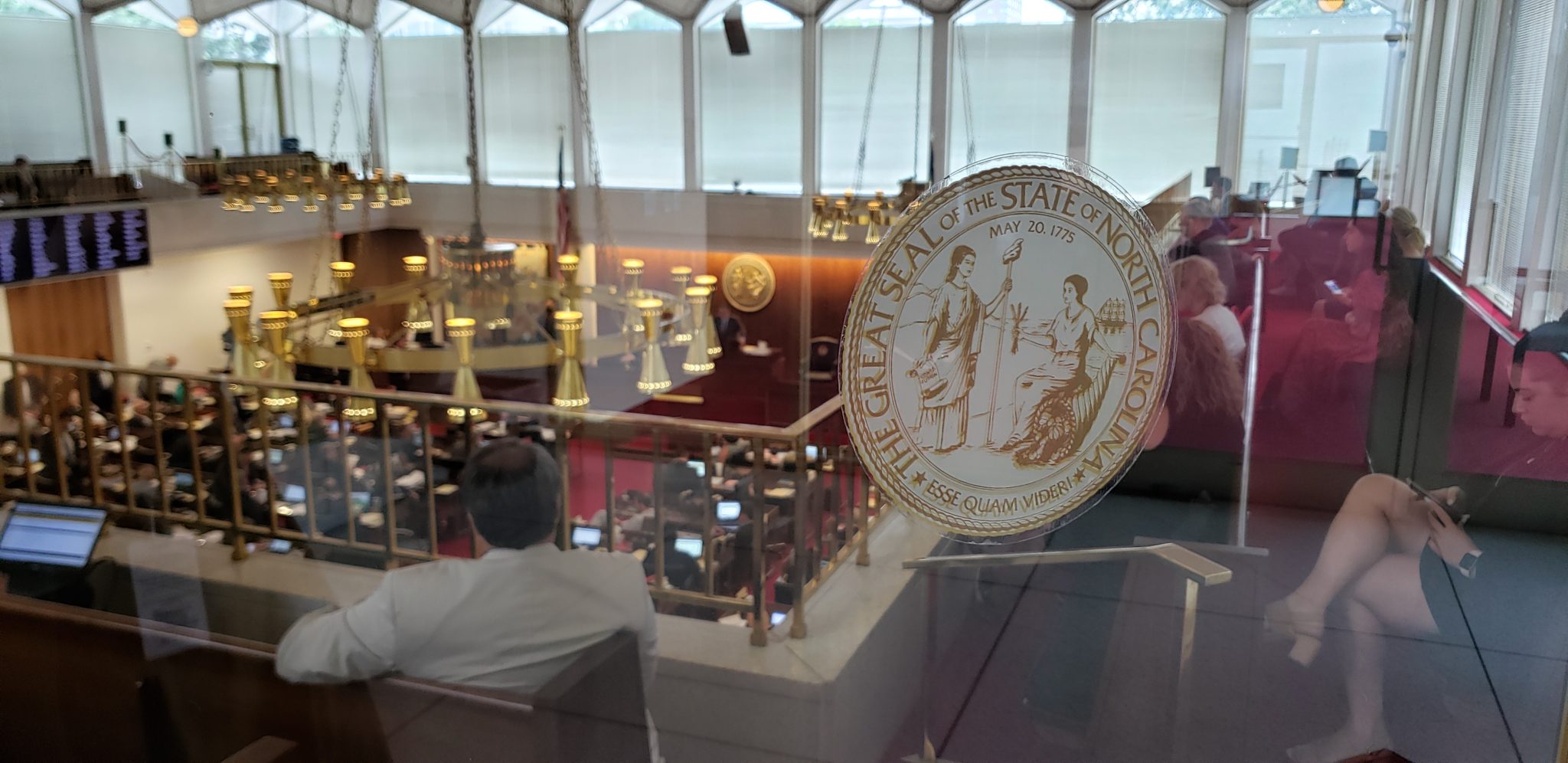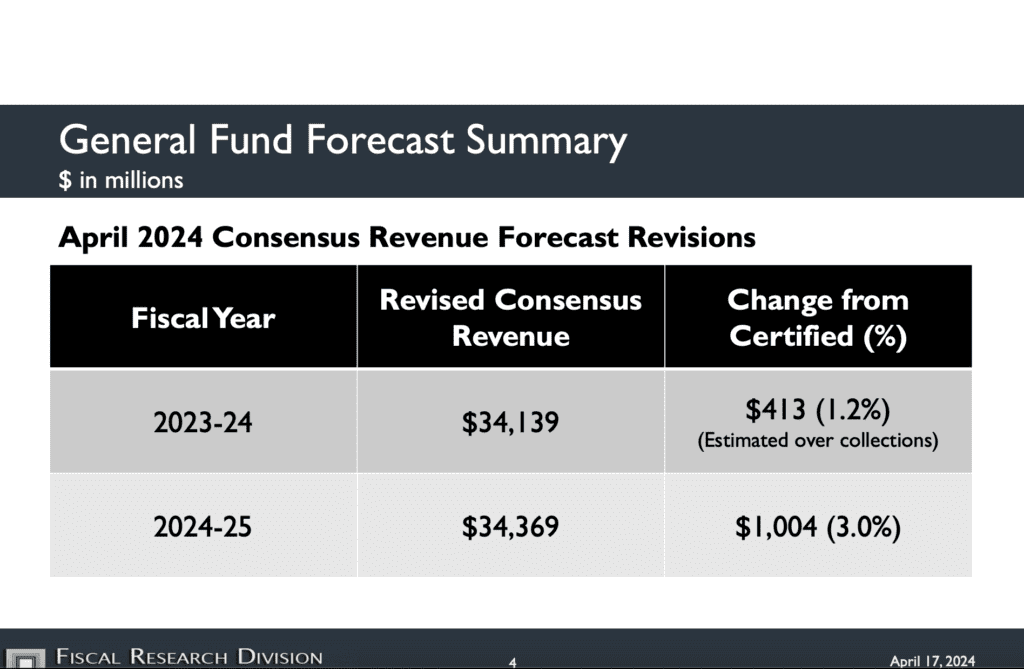North Carolina
North Carolina forecasts one-time $1.4 billion budget surplus

 |
North Carolina has a projected one-time $1.4 billion surplus in state revenues through Fiscal Year (FY) 2025, according to the latest consensus revenue forecast released on Wednesday by the Office of State Budget and Management (OBSM) and the General Assembly’s Fiscal Research Division.
That surplus includes an estimated $413 million in the current fiscal year, and an estimated $1 billion in additional revenue in FY 2024-25.
With those extra anticipated funds, the revised revenue forecast for FY 2023 is $34.14 billion, a 1.2% increase from the certified budget. In FY 2024-25, the revised forecast is $34.37 billion — reflecting the expected $1 billion surplus, or 3% increase from the certified revenue.
The anticipated overcollections come from individual income and sales taxes, the OBSM document says, “due largely to continued growth in earnings and consumer spending.”
However, the forecast anticipates lower corporate tax revenues “due primarily to a larger-than-expected shift in business tax collections from corporate income tax to individual income tax.”
“The upward revision is due to more robust economic growth than foreseen at the time of the last consensus forecast in May 2023,” the OBSM consensus document says. “Contrary to the CFG’s (Consensus Forecasting Group) expectations in May 2023, the economy demonstrated greater resilience and avoided a predicted period of stagnant growth, or ‘slowcession,’ in late 2023 and 2024. Instead, the April 2024 consensus forecast expects a ‘soft landing,’ with inflation easing toward the Federal Reserve’s 2% target even as the economy continues to grow at a modestly slower pace than in 2023.”


Consensus forecasts are an essential component of the state’s budget process, as they help lawmakers know how much money is on the table to be invested.
The state’s legislative short session begins next week, on April 24. During this session, lawmakers can adjust the two-year budget passed during the previous long session and are able to discuss bills that previously passed one house or recommendations from a study commission.
Democratic Gov. Roy Cooper typically releases his budget proposal shortly after the consensus forecast comes out. Then, the House and Senate each release a proposal and work together to pass an updated compromise budget.
House Speaker Tim Moore, R-Cleveland, recently told media that he would like to fund more money for the Opportunity Scholarship program. The program, which funds private school vouchers at eligible schools, was expanded during the long session to all families regardless of income.
About 72,000 applications were received ahead of the deadline on March 1, and of that, the families of 13,511 students were notified that they received a scholarship for the 2024-25 school year.
Moore said Republicans are discussing funding an additional $300 million toward the program, the News & Observer reported. The 2023 budget set the revised appropriation for the Opportunity Scholarship grant fund reserve to $354.5 million in FY 2024-25.
The families notified so far that they would receive a scholarship were all Tier 1 families, meaning they came from the lowest income levels. This means additional funding would go toward families with higher incomes.
Moore also said he would like to fund an additional $400 million toward Medicaid, child care subsidies, and additional raises to school and state employees.
On Thursday, Moore released an email statement regarding the $1.4 billion surplus.
“Today’s revenue forecast is a sign that North Carolina is on the right track,” he said. “Our conservative approach to responsible spending has been effective in strengthening our economy and attracting business to our state. When those businesses bring thousands of jobs to NC and our economy is strong, all of North Carolina wins.”
The OBSM document used more uncertain language regarding the forecast.
The end of April is typically the most uncertain time for revenue collections, the document said. Another revised consensus will be released in mid-to-late May if actual collections differ significantly from the most recent forecast.
“Revenue forecasts are always uncertain,” the document says, “but a recent business tax change affecting pass-through entities has further raised forecast uncertainty for individual and corporate income taxes due to a shift in payments between tax types and to differences in taxpayer behavior between business entities and individuals.”
You can read the full OBSM forecast document here. You can also view the Fiscal Research Division’s forecast presentation here.

North Carolina
Biden administration plans to reclassify marijuana. What does that mean for North Carolina?
The Biden administration may change the federal government’s position on marijuana, according to reports about a plan that would recognize the medical use of cannabis.
The Drug Enforcement Administration will propose that marijuana be recategorized under the Controlled Substances Act, according to reporting by the Associated Press and NBC News. The outlets cite anonymous sources with knowledge of the plans.
The plan would not legalize marijuana, but it would reclassify it from a Schedule I drug — believed highly dangerous, addictive and without medical use — to a Schedule III drug that can be lawfully prescribed as medication.
The historic shift in American drug policy could have implications across the country, including in North Carolina, one of just 12 states that have not legalized cannabis for recreational or medical use.
Here’s a look at what the DEA plan could mean for the legalization of marijuana in North Carolina.
What would the federal reclassification of marijuana mean for North Carolina residents?
If the DEA recategorizes marijuana, it would have no effect on the legal standing of marijuana in North Carolina, said Phil Dixon, a professor at the University of North Carolina School of Government.
“This doesn’t change much of the situation on the ground,” he said Wednesday. “This has no impact on our own state criminal law.”
Marijuana is illegal in the Tar Heel State. Lawmakers would have to pass a bill to legalize the drug and Gov. Roy Cooper would have to sign the bill into law to change that, Dixon said. Or, if the governor does not sign the bill, both chambers would have to override the veto with a three-fifths majority vote.
More on the historic move: Biden administration plans to drastically change federal rules on marijuana, reports say
Federal reclassification of the drug, however, would loosen restrictions on the research of marijuana and medicine derived from marijuana, Dixon said. It could lead to more marijuana studies done on college campuses and at private pharmaceutical firms, he said.
How soon could marijuana dispensaries open in North Carolina?
When North Carolinians can expect to see marijuana dispensaries on state land depends on when the state legalizes the drug, Dixon said.
While the federal reclassification may lead to some momentum for marijuana legalization advocates, the administrative move alone does not necessarily mean that North Carolina residents will be able to shop at dispensaries any sooner, he said.
“It’s not going to lead to dispensaries because it doesn’t authorize medical nor recreational marijuana,” he said.
Could military cannabis regulations loosen?
Dixon said that although military installations are on federal land, the armed forces make their own rules. Federal reclassification of marijuana would not affect whether military personnel can use it, he said.
Can weed be purchased in North Carolina?
Marijuana can be purchased at one dispensary in the mountains of western North Carolina.
The first cannabis dispensary in the state opened April 20 in Cherokee. The 10,000-square-foot facility is on Eastern Band of Cherokee Indians land, where medical marijuana is legal under tribal law.
On state land outside of the Qualla Boundary, however, the drug remains illegal. Marijuana possession can result in misdemeanor and felony charges with up to $500 fines, a year in jail, or both.
Meanwhile in the mountains: North Carolina’s 1st dispensary opens on 4/20, but only for medical cannabis
Great Smoky Cannabis Company can only sell to people with medical marijuana cards issued by the EBCI, other tribal bodies or another state.
North Carolina residents with a medical attestation from a doctor that they suffer from one of 18 qualifying conditions can apply for a medical marijuana card at ebci-ccb.org.
The following conditions qualify a patient for an EBCI medical marijuana card:
- Acquired immune deficiency syndromes.
- Anxiety disorders.
- Autism spectrum disorder.
- An autoimmune disease.
- Anorexia nervosa.
- Cancer.
- Dependence upon or addiction to opioids.
- Glaucoma.
- A medical condition related to the human immunodeficiency virus.
- A neuropathic condition, whether or not such condition causes seizures.
- Post-traumatic stress disorder.
- Crohn’s disease.
- Sickle cell anemia.
- Amyotrophic lateral syndrome.
- Parkinson’s disease.
- A condition resulting in the patient receiving hospice care.
- A medical condition or treatment for a medical condition that produces, for a specific patient, one or more of the following: cachexia; muscle spasms, including, without limitation, spasms caused by multiple sclerosis; seizures, including, without limitation seizures caused by epilepsy; nausea; or severe or chronic pain.
Have North Carolina legislators moved to legalize marijuana?
Last year, a bill that would legalize medical marijuana in North Carolina passed in the Senate, but was still pending in the House when the legislative session adjourned in late October.
Details on last year’s bill: The state Senate approved a medical marijuana bill, The Compassionate Care Act
If the Compassionate Care Act passes, it would be among the strictest medical marijuana programs in the country, Dixon said. The bill narrowly defines where marijuana can be grown, sold, smoked and the medical conditions that would qualify a patient for a medical marijuana card.
Reporter Taylor Shook can be reached at tshook@gannett.com.
North Carolina
All-American Davis staying at UNC for fifth year

RJ Davis, an All-American and Wooden Award finalist last season, is returning to North Carolina for a fifth season.
Davis announced his decision in an Instagram post early Wednesday morning with the simple caption: “I’m back.”
The runaway winner for ACC Player of the Year, Davis averaged 21.2 points and 3.5 assists per game last season while shooting 39.8% from 3. He was North Carolina’s first Associated Press All-American since 2017.
His anticipated return had the Tar Heels at No. 8 in ESPN’s Way-Too-Early Top 25. North Carolina won the ACC regular-season title in 2023-24 and received a No. 1 seed in the NCAA tournament, reaching the Sweet 16 before falling to No. 4 Alabama.
Information from ESPN’s Jeff Borzello was used in this report.
North Carolina
Some North Carolina Abortion Pill Laws Are Preempted, Judge Says

North Carolina laws exceeding US Food and Drug Administration limitations on the prescribing of the abortion-inducing drug mifepristone are preempted by federal law, a US judge ruled on Tuesday.
However, US District Judge Catherine Eagles in Greensboro added, state laws “that focus more on the practice of medicine and a patient’s informed consent,” that haven’t been addressed by the FDA, don’t frustrate congressional purpose and are not preempted.
Eagles’ 49-page ruling granted summary judgment in favor of the plaintiff, Dr. Amy Bryant on the former, and in favor of intervening state lawmakers on the latter. North Carolina Attorney General Josh Stein, a Democrat, had sided with Bryant, the judge explained.
Her ruling comes roughly one month after the US Supreme Court heard related arguments over the safety of the drug in a case brought by anti-abortion doctors seeking to reverse FDA measures that made it more widely available to end pregnancies.
Eagles heard arguments on the state law case in February.
The FDA in 2000 approved mifepristone’s use to end pregnancies during the first 10 weeks. Since then, it has been used by more than 5 million patients and now accounts for about half of all abortions in the US, according to Bryant’s Aug. 7, 2023, amended complaint.
More recently the drug became a prime target for anti-abortion activists who two years ago succeeded in their decades-long quest to persuade the Supreme Court to overrule its 1973 decision in Roe v. Wade, that found a constitutional right to an abortion.
Enacted last year, the challenged North Carolina measures imposed tightened restrictions on mifepristone’s use within the state, requiring its in-person distribution by a doctor, banning access through licensed pharmacies, imposing informed-consent requirements, and requiring ultrasound examinations in certain circumstances.
Those part of the state’s law requiring an in-person 72-hour advance consultation, ultrasound use, in-person examination, and other measures to the state “deal with informed consent and broader health and safety matters and are not preempted,” Eagles said.
“But the provisions that require physician-only prescribing, in-person prescribing, dispensing, and administering, the scheduling of an in-person follow-up appointment, and non-fatal adverse event reporting to the FDA stand as obstacles to Congress’ purpose in creating a comprehensive federal regulatory scheme for higher-risk drugs run by the FDA and are preempted,” she said.
The case is Bryant v. Stein, M.D.N.C., 1:23-cv-00077, 4/30/24
-

 Education1 week ago
Education1 week agoVideo: Dozens of Yale Students Arrested as Campus Protests Spread
-

 News7 days ago
News7 days agoLarry Webb’s deathbed confession solves 2000 cold case murder of Susan and Natasha Carter, 10, whose remains were found hours after he died
-

 World6 days ago
World6 days agoHaiti Prime Minister Ariel Henry resigns, transitional council takes power
-

 Politics1 week ago
Politics1 week agoFetterman hammers 'a–hole' anti-Israel protesters, slams own party for response to Iranian attack: 'Crazy'
-

 World1 week ago
World1 week agoPeriod poverty still a problem within the EU despite tax breaks
-

 World7 days ago
World7 days agoUS secretly sent long-range ATACMS weapons to Ukraine
-

 News6 days ago
News6 days agoFirst cargo ship passes through new channel since Baltimore bridge collapse
-

 World1 week ago
World1 week agoTurkey’s Erdogan meets Iraq PM for talks on water, security and trade


















